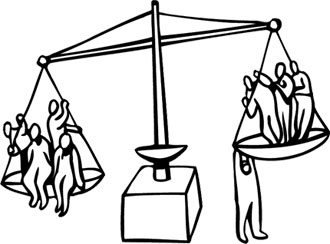
|
 |
 |
|
|
|
|
|
|
|
|
|
|
|
|
|
|
|
|
|
|
|
|
|
|
Justice is the Basis of StabilityIn our societies, we hear about the importance of respect and application of law and the need for an effective system of justice; as we hear about the importance of the presence of the other opinion; and respect for cultural diversity and other diversities as well as the need to establish the values of citizenship rights and duties, among others. But all this may not be found in the manner that we want applied on the ground. In fact, wherever you go you will find violations whether in official bodies, the institutions of civil society or even in the dealings of individuals with each other. This makes the issue of application of values, especially Justice, a questionable matter, and leads one to wonder whether everybody wants these values in deeds rather than in words only. An ancient Arab saying reads: “Justice is the foundation of sovereignty” i.e. justice provides a guarantee for continued governance and stability of the society. If we do believe that, then why do violations occur and expand greatly, to the extent of even including the judiciary system that is charged with the realisation of the principle of justice itself?
Apparently, at least in our Arab countries, there is a crisis of lack of vision and perception as to the effectiveness and usefulness of justice. Needless to say that if justice had been espoused firmly in the first place, it would have never been breached. If a judge, for instance, could not comprehend that a just ruling, even if it benefited an offender, is a necessity for public order and for the community; and if he is unaware that any bias may lead to the destabilization of the very foundations of the state, the encouragement of people to rely on their muscles and to take the law into their own hands, in addition to the mobilization of the community against the government and its organs. If that was the case and the judge succumbs to his own passions or to the perception that justice does not bring security, and that stringency and lawlessness are required, then, and only then, he will have no qualms about issuing an unfair sentence nor will he consider it an evil act to breach the law. In such a case, the issue is not essentially attributable to a lack of technical competence, nor to the need for training, professionalism and experience, as much as it could be blamed on an overall lack of vision regarding the running of the affairs of the state and achieving public interests. This can also apply to those who violate the law in prisons through the practice of torture. They may think that their violation serves security by inflicting harm upon those deemed to be in breach of law according to their own view, and not necessarily from the legal viewpoint. Such violators believe that what they are doing is beneficial to achieving stability and deterring criminals. They do not know that the most serious violence that has threatened our Arab societies (in Egypt, for example) only grew up in the incubators of violence within the prisons, and that what afflicted regimes the most is that their use of illegitimate and illegal violence has rebounded on them in the form of waves of rebellion . Torture or illegal repression provoked the families and relatives of victims against the government itself. Thus, the injustice has re-produced itself and re-emerged in the form of a lack of social, political and security stability. The inequitable distribution of wealth or services between regions and social groups coupled with political monopoly based on marginalization and domination of a particular culture or subsidiary identity at the expense of another, together with other forms of injustice, create incubators of instability. Such instability grows further with the increase in the volume and variety of forms of injustice, especially if it is not met by a deterrent stance from state officials, in which case suspicions would expand to include all institutions and officials and widespread discontent will seek an outlet to explode in the face of everybody. We are essentially required to widen the horizon of those undertaking the service of citizens in all organs of the State, especially in the areas of law enforcement and the judiciary. Unless those officials realize that law and justice, is a necessity for the victim, the community and the state, it will be of no avail to train and transfer experience to them, even if there was a shortage in this area. Therefore, we think that there is an urgent need to address the root cause of the problem, and instil the conviction, through teaching and education, that justice is a bulwark of the society and the state, rather than of the regime alone. There is a need to learn that the further the deviation from the principles of justice, the greater is the lack of stability, and the greater the potential for the country to become poised to burst, regardless of the intensity of repression, and the false impression that injustice appears to have achieved its desired outcomes. We are also required, to combat the cancerous injustice with justice, in order to prevent the spread and subsequent explosion of injustice. It is true that injustice, in one way or another, does exist in all countries of the world. However, some countries publicly expose and isolate injustice as well as punish its perpetrators to prevent its expansion, while others tolerate it and hence are afflicted by its spread, while the society with all its segments loses its stability and security. |
